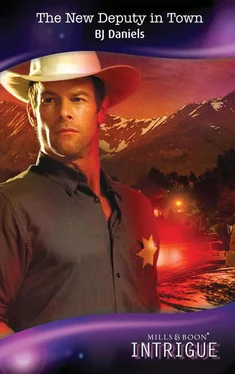All of that Laney could chalk up to love.
All except the bruises on Maddie’s arm.
And Laney’s own feeling that something wasn’t right with her cousin.
She closed her book, glancing up the lane. That sense of nagging expectation washed over her again as if at any minute she would see someone coming down the road toward the house with bad news.
“Let’s take some cookies to the hospital for the nurses,” Laney said as she brought the plate and lemonade glasses into the kitchen to find her sister deep in an old cookbook. “I want to go visit Gramma.”
Laci looked up. “Do you mind going without me? I hate seeing Gram like that and I really need to get to work on this party. I’m thinking it should be next Saturday. I’m sure we can use the community center.”
Laney knew how hard it was for her sister to see their grandmother Pearl after her stroke. Gramma’s eyes were open, but she was unresponsive. It was questionable if she could even understand what they said to her. Or if she recognized her granddaughters at all.
Gramma Pearl had been in the hospital with pneumonia when she’d suddenly had a stroke. Gramps said she’d been upset about some things that had been going on in Old Town Whitehorse.
“I think we both should go see Gramma,” Laney said. “As it is, Gramps won’t be happy with us since we didn’t attend his church service this morning at the center. Maybe we can bribe him with some of your cookies because you know he’ll be with Gramma.”
Laci nodded although with obvious reluctance. “As long as you keep him from talking about Mother. I can’t bear it. He really believes Geneva will just come home one day as if nothing happened. Why can’t he accept that she’s gone and won’t ever be back? For all we know she’s dead.”
“He has to believe he’ll see her again,” Laney said although she agreed with her sister. Wherever Geneva Cavanaugh Cherry was, this was the last place she’d ever return.
DEPUTY SHERIFF NICK ROGERS had never been to Old Town Whitehorse before. He would have missed it entirely, if he hadn’t slowed down to let a dog cross in front of his patrol car and seen the sign barely sticking up out of the weeds beside the road.
Whitehorse. Population 50.
He truly doubted that, given the age of the sign.
Nick had driven five miles through rolling grassland and open sky. He’d heard this land called the Big Open. He could well understand why.
And after all that way, he’d arrived in Old Town Whitehorse. Well, what was left of the original Whitehorse. There were a few buildings. No store. No gas station. No bar. Just what appeared to be a community center, an ancient abandoned gas station and a few houses still standing.
He could make out the trees and roofs of a few farms or ranches not far from town, but this whole place felt more like a ghost town than anything else.
One big old house in particular reminded him of a haunted house he and his friends used to throw rocks at when he was a kid. He stared at the two-story house. It sat apart from the others. The paint had peeled and it appeared kids had broken out most of the upstairs windows. The lower ones were boarded up. The mailbox out front had fallen over, but he made out the word Cherry as he drove past.
He rolled his window down and breathed in the smell of fresh-cut hay. He couldn’t help but laugh at himself. He’d been looking for a place to escape. Literally. And he’d found it in Montana. No one would ever look for him here—let alone find him. At least if he hoped to stay alive.
If Whitehorse wasn’t the end of the earth, then Old Town definitely was. He’d heard someone joke the first night he’d gotten into town that “Whitehorse isn’t the end of the earth, but you can see the fires of hell on a clear night.”
Nick had been to hell. Maybe that was why he’d felt at home here right off.
Alice Miller lived in a big white ranch house west of town. As he pulled into the yard, two blue heelers with spooky white eyes came out to bite at his tires.
The house was sheltered by rows of trees that had to stand over fifteen feet tall. Past the house and trees, the country ran south through open prairie to what appeared to be a thin line of green. The Missouri Breaks.
He could understand why Old West outlaws had made this isolated, underpopulated country their hideouts. It had worked for Kid Curry and Butch Cassidy and the Sundance Kid. At least for a while.
Nick was counting on it working for him.
At least for a while.
He eyed the barking dogs. He had a healthy respect for ranch dogs since arriving in Montana and waited until an elderly woman in a housedress and apron opened the front door and called off the dogs before he got out.
Alice Miller was petite with serious blue eyes and bobbed gray hair. She led him around the back of the house to a chicken coop.
“There you are,” she said as if that should clear things up for him.
He looked into the empty coop. Yep, things were clear as mud. “How many chickens did you have?”
“A dozen layers, four roosters and three old stewing hens.”
“Nineteen chickens and they were all gone this morning,” he said.
She nodded and waited as if she expected him to produce them like a magician pulling a rabbit out of his hat.
“That’s a lot of chickens to disappear,” he remarked. When he’d found this job, he’d been amazed at the kind of calls a deputy sheriff in Whitehorse, Montana, had to deal with. Dog at large, owner warned. Drunken disturbance at rodeo, citizen given ride home. Missing resident, found two doors down.
As a big-city cop, he’d dealt with every crime imaginable. At least he thought he had. But he’d never been called out to investigate nineteen missing chickens.
He was out of his league and he knew it.
“What do you think happened to them?” he asked Mrs. Miller.
She cocked her head and looked up at him as if he might be pulling her leg. “Clearly someone stole them.”
“How do you know a coyote or something didn’t come in and eat them all?”
“You see any feathers?”
Actually, he did. There were feathers all over the chicken coop.
“You see any blood, any bones?” she asked with growing impatience. “Where are you from anyway?”
“Houston.”
“Where’s your Texas accent?” she asked.
“I wasn’t born there. My father was in the military. We traveled all over.” It was the story he’d come up with. It made things simpler. And safer.
Mrs. Miller let out a little huff sound and put her hands on her hips. “Aren’t you going to look for fingerprints? Tracks? Something?”
Fingerprints? She couldn’t be serious. As for tracks, it had rained the night before. There were lots of tracks, all appearing to have been made by her dogs.
“I got wash to do,” she said and headed for the side yard.
He circled the chicken coop, feeling like a fool. He’d never tracked anything in his life. This was nothing like chasing a convenience-store robber down an alley and over a couple of fences.
To his surprise, he found some tracks that looked out of place. He squatted down next to one of the prints. The sun had already baked the surface of the yard. The print was that of a boot. A small one. A kid’s.
Nick walked around to where Mrs. Miller was hanging sheets and towels on a clothesline.
“Who all lives here?” he asked.
“Me and my husband. He’s out cutting hay. Why?”
“You have any grandchildren, any children who have been over to visit in the last day or so?”
“No. What does that have to do with my chickens?”
“No neighbors with kids?” he asked.
Alice Miller wrinkled her brow. “There is that boy, his aunt and uncle are renting the farm next door.”
Читать дальше












